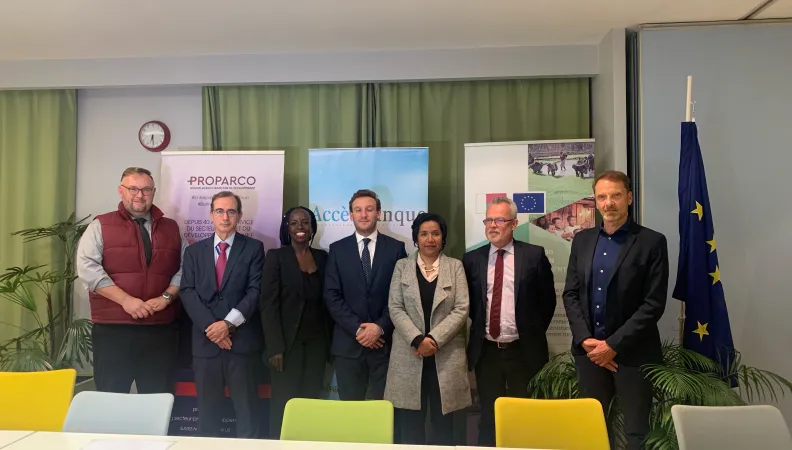Share the page
The European Union and France are supporting the development of responsible financial inclusion in Madagascar, through a financing from Proparco to AccèsBanque Madagascar
Published on

On the occasion of the French Presidency of the Council of the European Union, which began on January 1 and ends on June 30, 2022, Proparco and the European Union (EU) are continuing their partnership with the granting of a line of credit equivalent to €5 million in ariary to the Malagasy microfinance bank, AccèsBanque Madagascar (ABM). This line of credit will be guaranteed by funds from the European Fund for Sustainable Development (EFSD), the EU's private sector support tool, implemented by Proparco. The Currency Exchange Fund N.V. (“TCX”) is providing the currency hedge that eliminates the FX risk of the credit line. With its “EU Market Creation Facility – Pricing Component”, which also benefits from an EFSD guarantee, TCX can offer the hedge at concessional pricing in sub-Saharan countries.
In Madagascar, access to financial services is limited: only 29% of Malagasy households have access to formal financial services and 3% have access to credit from a bank, according to the World Bank. Lack of access to credit is the third most important constraint to growth in Madagascar, according to the World Economic Forum. The Covid-19 crisis has further hampered access to financing and affected business activity and employment, including in the informal sector.
In this context, the financial inclusion of the Malagasy population is one of the priorities to guarantee an inclusive and sustainable growth in the country.
AccèsBanque Madagascar (ABM), a subsidiary of Access Holding, contributes to the financing of Malagasy companies. Having a strong entrepreneurial orientation, ABM targets and facilitates the financing of SMEs and microenterprises. By diversifying its offer, in an innovative way, notably through digitalization, ABM is contributing to greater accessibility to financial services in Madagascar. The project will also enable the development of network of SMEs and microenterprises and stimulate employment generation in the country. This operation also participates in the French Choose Africa initiative, launched by AFD Group in March 2019.
The project is supported by the EU, which has been strengthening its commitment to the private sector for several years. The EFSD guarantee tool, which Proparco implements, makes it possible to strengthen access to financing in emerging countries, thus promoting inclusive and sustainable growth. Through a second EFSD program sponsored by the European Commission, which has been funded by the European Union and supported by KfW, TCX is able to offer its local currency hedging instrument to Proparco at favorable conditions for the final benefit of ABM. TCX provides derivatives to its counterparties, which reduce the foreign exchange and interest rate risk embedded in their local currency operations. It thereby supports sustainable lending from international lenders to borrowers in emerging and frontier markets.
"This operation is perfectly in line with Proparco's strategy of supporting small and medium-sized enterprises (SMEs) in emerging countries. The EFSD guarantee allows us, together with the European Union, to support a key player, ABM, and thus strengthen the Malagasy economic fabric," said Djalal Khimdjee, Deputy Director General of Proparco.
"AccèsBanque Madagascar is concerned with the development and growth of Malagasy households. Broadening the bank's impact is a key priority, in line with our values : non-discrimination and social responsibility. The actions and strategic deployments carried out, especially since the COVID19 crisis, aim to allow a maximum of clients and beneficiaries to keep their jobs, to maintain and develop their businesses and most importantly, to live decently, while dreaming for a better future. Access to this fund is an exceptional opportunity for the bank to participate in responsible and caring financial inclusion." Mikhail Velichko, General Manager of AccèsBanque Madagascar.”
"We are pleased to witness today the signing of a financing agreement between ABM Bank and agreement between ABM Bank and Proparco, supported by the European Union through the guarantees of the European Fund for Sustainable Development (EFSD). The objective is to support businesses in Madagascar and to increase investment for development," added investments for development" added the Delegation of the European Union to Madagascar. Delegation to Madagascar.
Ruurd Brouwer, CEO of TCX: “We are delighted to have supported this credit line in local currency for AccèsBanque Madagascar together with our shareholder Proparco. TCX is committed to contribute to financial sector development in the poorest countries by de-risking local currency transactions for our clients and their investees. Through the EFSD facility, TCX can place some of the risk that comes with pricing frontier market currencies with the EC, allowing for a pricing reduction that can make the difference.”
This project will thus contribute to Sustainable Development Goals #8 ("Decent Work and Economic Growth") and #10 ("Reduced Inequality").
